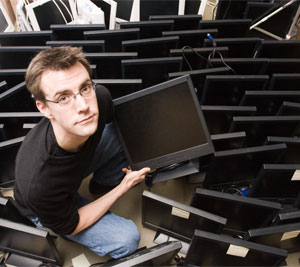 |
| Information Technology Services's Robin WestĀ poses with monitors that will be reused. (Court Milley Photo) |
Dalhousie has launched a new electronics recycling program, dubbed āe-recycling.ā
Since October, Dalhousie departments have been able to arrange for pick-up of electronic productsā such as old or broken desktop computers, monitors, laptops, printers and televisionsā that no longer have reuse potential. The service is offered free of charge and is activated by filling out an .
Once the material is collected, Information Technology Services (ITS) will take care of erasing the memory to ensure privacy. Then, the old and out-of-date materials will be transported to a depot where metals, glass and plastic are separated and recycled into new products.
The e-recycling program is Dalhousie's sixth recycling program. Dalhousie also recycles fine paper, newsprint, corrugated cardboard, beverage containers and batteries.Ā
Rochelle Owen, Dalhousieās Director of Sustainability, applauds the initiative.
āTo move towards greater sustainability, the amount of waste we produce must be minimized. All processes in the life-cycle of a product need to be made as efficient as possible,ā she said.
Dalās e-recycling program was given a big green thumbs up by The Hourās George Strombolopoulos on a recent show. Mr. Strombolopoulos is spearheading CBCās One Million Acts of Green; the idea behind the campaign is that small acts add up and create a big difference. He congratulated Dalhousie for removing obsolete technology from the waste stream.
One Million Acts of Green also singled out pilipiliĀž»ās recent campus light bulb exchange. The student-led initiative oversaw the distribution of 1,000 energy efficient CFL light bulbs.
Dalhousieās efforts to conserve energy expended by electronics have included replacing old computers in labs with new energy-saving computers. This new technology burns 40 per cent less energy than the previous computers, amounting to a savings of 400,000 kilowatt hoursā enough energy to run 44 average houses for a year.
Programs created by the Office of Sustainability have fostered interest and concern all over campus. In addition to the electronics recycling program, pilipiliĀž» is working to incorporate sustainability concepts and criteria into all major planning, assessment, policy, reporting and communications products and procedures.
āOutstanding lectures, courses and programs explore a wide range of environment and sustainability-related issues that contribute to a new way of thinking,ā says Ms. Owen.
